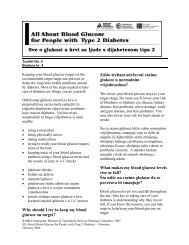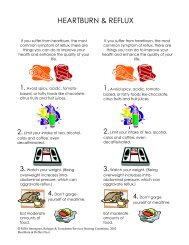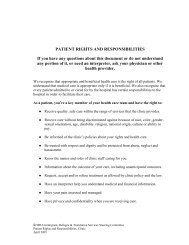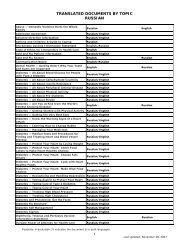cuidado del bebé care for baby - Health Translations
cuidado del bebé care for baby - Health Translations
cuidado del bebé care for baby - Health Translations
You also want an ePaper? Increase the reach of your titles
YUMPU automatically turns print PDFs into web optimized ePapers that Google loves.
DORMIR — SLEEP<br />
No hay reglas de cuándo debe o no debe dormir su bebé. Su recién nacido puede dormir<br />
de 16-18 horas al día, pero puede no dormir por largos periodos. Por algún tiempo,<br />
puede esperar algunos momentos de comida por la noche. Algunos bebés pueden dormir<br />
durante la noche a las 6 semanas de nacidos; mientras otros no llegan a este momento<br />
hasta que tienen 5-6 meses de edad o más.<br />
There are no rules <strong>for</strong> when a <strong>baby</strong> sleeps, or doesn’t. Your newborn may sleep <strong>for</strong> 16-18<br />
hours a day, but he or she may not sleep <strong>for</strong> long stretches. You can expect several night<br />
time feedings <strong>for</strong> awhile. Some babies may sleep through the night as early as 6 weeks,<br />
while many do not reach that milestone until they are 5-6 months old or older.<br />
A veces puede ajustar los patrones de sueño para que se acomoden a un ciclo de nochedía.<br />
Intente con estos consejos.<br />
You can sometimes adjust patterns of sleep to fit a night-day cycle. Try these tips.<br />
• En la noche, ponga a su bebé a dormir en el moisés o en la cuna. Cuando su bebé se<br />
despierte, déle de comer y cámbielo silenciosamente. Mantenga las luces bajas y<br />
limite las distracciones para que su bebé se vuelva a dormir más pronto.<br />
At night, put your <strong>baby</strong> to sleep in a bassinet or crib. When your <strong>baby</strong> awakens, feed<br />
and change him or her quietly. Keep lights dim and limit distractions so that your<br />
<strong>baby</strong> will go back to sleep sooner.<br />
• Durante el día, ponga a su bebé a dormir en la cuna o en el asiento para bebé.<br />
Despierte a su bebé para alimentarlo, y hable y juegue con su pequeño. Haga caras<br />
chistosas para su bebé. Mientras más tiempo esté despierto su bebé durante el día,<br />
más probable es que duerma durante la noche.<br />
During the day, put your <strong>baby</strong> in a cradle or infant seat to sleep. Wake your <strong>baby</strong> <strong>for</strong><br />
feedings, and talk and play with your little one. Make funny faces <strong>for</strong> your <strong>baby</strong>. The<br />
longer your <strong>baby</strong> is awake during the day, the better he or she is likely to sleep at<br />
night.<br />
Durante las primeras semanas después de su nacimiento, puede ser más fácil para usted<br />
que el bebé duerma en su habitación. También está bien si usted descansa mejor con su<br />
bebé en otro cuarto. Un monitor electrónico para bebés puede ayudarle a escuchar<br />
cuando su bebé está despierto. Por razones de seguridad, su bebé no debe dormir en la<br />
cama con usted.<br />
During the first weeks after birth, you may find it easiest if your <strong>baby</strong> sleeps in your room.<br />
If you will rest better with <strong>baby</strong> in another room, that’s okay too. An electronic <strong>baby</strong><br />
© MHA Immigrant, Refugee & Translation Services Steering Committee, 2004<br />
Care <strong>for</strong> Mother— Spanish<br />
October 2004<br />
25










